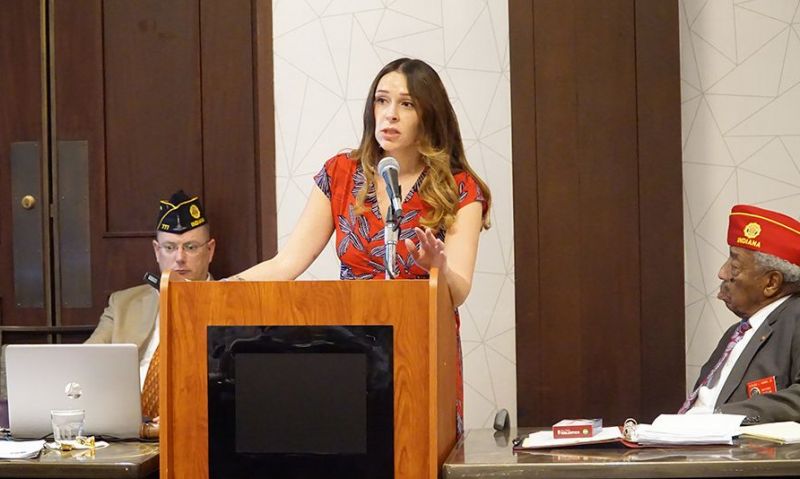
Department chaplains learn about SAVE for suicide prevention
Christa Sutton, a suicide prevention case manager and community outreach specialist at the Richard L. Roudebush VA Medical Center in Indianapolis, shared with American Legion department chaplains during their conference Sept. 21 that on average, there are 764 suicide attempts per month among veterans receiving recent VA health care services.
Suicide is a “public health crisis, and we need everyone on board,” said Sutton. “We believe clergy and religious leaders are an important link to helping their congregants get the mental health care they need. We believe you may be the first person (veterans) turn to for comfort, guidance and help when they are facing mental health issues.” Sutton added that health issues can be depression, anxiety or thoughts of suicide.
Sutton shared one of the VA’s many suicide prevention efforts, which is SAVE: signs, ask, validate and encourage. The acronym can be used to help American Legion chaplains remember the important steps to suicide prevention:
- Signs of suicidal thinking should be recognized (ex. withdrawing from family and friends; looking for ways to die; talking about death, dying or suicide; feeling like there’s no reason to live; anxiety, agitation, sleeplessness or mood swings). “We want to take all comments regarding suicide seriously and address it like it is a crisis. That’s what it is,” Sutton said.
- Ask the most important question of all – “’Are you thinking about killing yourself?’ It’s a difficult thing to say if you haven’t had to ask that question. But it’s very important to ask clearly and concisely,” Sutton said. “Have a level of comfort asking that so it doesn’t make that person feel like they’re being judged. Because there’s a lot of shame that comes along with admitting that, like I’m not strong enough, saying that makes me weak.”
- Validate the veterans experience (ex. recognize that the situation is serious; do not pass judgment; reassure that help is available).
- Encourage treatment and expedite getting help. “The intention is not for you to make a diagnosis, we do not expect you to treat that person from a mental health professional standpoint,” Sutton said. “Get them to seek help immediately, whether that be to the ER or calling the Veterans Crisis Line.”
Call 1-800-273-8255 and Press 1 for veterans, text to 838255, or chat online at VeteransCrisisLine.net to receive confidential crisis intervention and support available 24 hours a day, 7 days a week, 365 days a year.
“There’s a licensed professional on the other end of that phone who will talk to that person, who will assess that person, put a safety plan in place with them and help them get with their VA or linked with community resources,” Sutton said. “Or you can call (the Veterans Crisis Line) and say ‘Hey, I’m not sure what to do here.’ They will help.
“You have the power to change thousands of (veterans) lives.”
